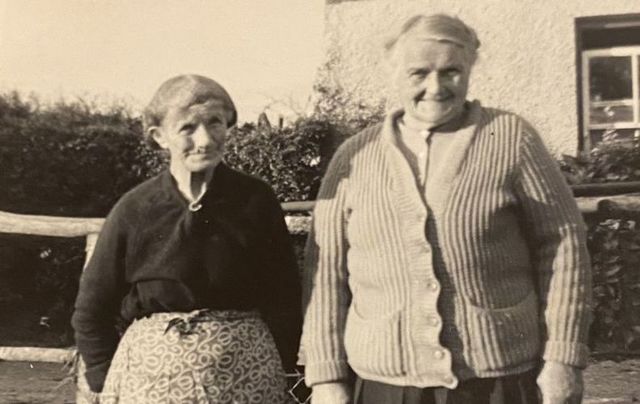Reflecting on his Granny's life while sorting through her belongings in her abandoned cottage a doting grandson uncovers a shoebox filled with mementos that reveal the deep sorrows and cherished memories she quietly carried throughout her life.
The "For Sale" sign unsettled me as I opened the gate to Granny's old cottage reminding me that what I had known here once was gone forever. The bottom bars of the gate were thick with rust and Granny's blazing red roses were lost in yellow ragwort.
The cottage itself had been a long time vacant yet I half-expected a familiar face to appear at the kitchen window. They are all pale memories now. The faces that I'd seen through the glass when I was a boy crossing the graveled yard, barked all the way to the door by Granny's mad mongrel, Patch.
Granny, Grandad, uncles, aunts, they are all gone now, their stories here long since ended.
Once, in ordinary, unremembered days, they had all come and gone across this yard from gate to front door. Too busy with the here and now of their lives to imagine a time such as this an end-time of weeds and overgrowth.
Nor could they have imagined a skip sitting outside their front door, a skip that I had come to fill with the remnants of Granny's world.
It was hard, handling Granny's things because something of her lingered and ghosted around everything, especially things that had been a part of her - her crossover apron, still hanging behind the kitchen door, the pot she'd used to make drisheen for us and her Sunday shoes misshapen by her bunions.
"Lord have mercy on me poor aul' bunions," she used to say, laughing.
I move quickly to and from the skip, pausing when I came to the ornaments that had brightened Granny's mantlepiece and her life. Some she'd bought herself, others had been brought from various parts of England by her daughters on summer visits.
"Would you look at what they're after bringing from London this time," I remember her saying once, as she showed me the latest figurine.
Now, thrown in the skip, they would become junk that nobody wanted.
In her bedroom, I came upon a shoebox at the bottom of her wardrobe.
I lifted the lid at the kitchen table and old ghosts seemed to rise around me on the musty odor from old photographs, stained letters, mortuary cards, and Granny's prayer book.
I touched the pale photographed faces of Granny and Fan Dalton, neighbors and best friends through good times and bad, younger than I'd ever known them, all dressed up for some occasion. God knows how many cups of tea they'd enjoyed together at this kitchen table, maybe remembering that long-ago day when they were dressed up in their finery.
And there was Aunt Jixie, long since passed away, standing in the yard beside a green Austin Cambridge with English plates. Smiling face forever unwrinkled, stylish-looking in her summer frock home from England to visit Granny.
I shuffled through colored snaps of well-dressed children, my English cousins wearing clothes that we'd worn later as castoffs. There was Jixie's son, Graham, looking mod in a red and black zipped jerkin. My brothers and I had argued over who would get that jerkin, but it had fitted me and I'd worn it proudly for the first time in that year's May procession.
I opened Granny's prayer book. Two brown-tinged mortuary cards slid onto the kitchen table.
I read and re-read them and my eyes were slowly opened to something about Granny that I'd only half-heard and had since forgotten.
!n 1948, she'd lost her youngest daughter, Maura, to tuberculosis and soon after Grandad had died suddenly.
I stared at their lost faces and, too late, my heart went out across the years to Granny as I realized the depth of sorrow that she'd known long before I was born.
I remembered how, as a boy, I'd noticed something in Granny's eyes that I couldn't name. I'd seen those eyes wet from laughing at stories Fan Dalton would tell but that something would always ghost back when the laughing subsided.
Now, I could see what was beyond me then. I had glimpsed the sadness beyond weeping in Granny's sorrowing heart. She had lost so much: Aunt Maura and Grandad were taken early, and her other six daughters were lost to emigration.
I'd never heard her speak of it but her heart must've been breaking quietly every day. I'd just expected her to be Granny, always strong, always there in her cottage smiling kindly whenever I chose to call.
And she always was.
Late in the evening, my work done, I left carrying Granny's shoebox of memories pausing outside to take a last long look at the cottage.
Missing her face at the window, and her usual little wave as I looked back. Soon other stories would be told, other lives would be lived here.
I closed the gate gently and walked away for the very last time.
This article was submitted to the IrishCentral contributors network by a member of the global Irish community. To become an IrishCentral contributor click here.




Comments